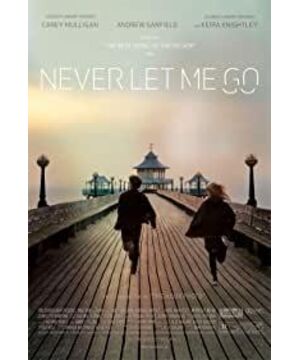Literary films are more or less different from the ordinary life of ordinary people, so that they can appear special literary and artistic, such as deserted islands, such as broken families, such as war years. This film makes the literature and art more thorough, so the background of the story is placed in a society created by science fiction, and the protagonists of the love story have also become a group of special people, some people who were created by humans for organ transplantation. Taste.
It is under such a special background that love stories can have a special development, that is, people who love each other will have their lives deprived at any time, and people who love each other are not considered by society as normal people who can love each other.
In fact, this kind of love background will have similarities in many movies, such as love in the war years, such as couples who are terminally ill. But the story of this film still has its unique features, which can inspire people to think and attract people into the film:
First, the lifespan of this group of people is artificially controlled by other groups of people. They were created so that everything about them is controlled by their creator, normal human beings. Even if it is war, even if it is a death row prisoner, even if it is a terminally ill patient, what they are waiting for is definitely not the day when they will be free today and be a mermaid tomorrow.
Second, this group of people is lonely and fearful of society. They were kept in the Hayerson School and received special education, isolated from the general population. They do not understand social common sense, and they are terrified of everything in society. And their genes come from the bad elements of society, they have a natural inferiority complex.
Third, this group of people is not socially recognized. In fact, they basically do not have any so-called human rights, because they only exist as a combination of artificial organs. When their organs are artificially taken away, the skin that wraps the organs loses the meaning and possibility of existence.
I didn't expect this to be such a sad movie when I decided to watch it. From the beginning, the atmosphere of terror was shrouded in horror, and then it turned into despair. I couldn't pull myself away from the movie, and I couldn't help but grieve and despair along with the characters.
The most moving thing in romance films is hope, and the most tear-jerking thing is despair. I guessed early on that the rumors about the "deferred donation" were rumors, but I was still moved by the sincere efforts of the hero and heroine in front of a little hope. Of course, Tommy's cry of desperation, when in the end all proved impossible, brought me almost to tears offscreen.
If fate is doomed, then, still to love!
There is one detail in the film about love that gave me a lot of thinking, that is, the principal of Haiersen explained why he collected the artworks of this group of special children: she said that she had been trying to prove the ethical issues of this matter, proving These special children have souls, but the questions she wants to answer have never been asked. This place makes me think, in our society, whether too much profit orientation makes us ignore the ethical and moral issues that we may be more concerned about in the pre-industrial age?
In addition, at first I didn't understand that the principal fired the teacher who told the truth. I felt that the teacher was a brave person who told the truth that others dare not tell. However, after the principal gave the final explanation, I understood the principal: she was right! The teacher's so-called truth statement is actually to let the children know their own destiny prematurely, making them despair prematurely and unable to get out of their own destiny; these children who may have their own souls have entered prematurely. The shadow of despair lost the opportunity to cultivate his own independent soul.
This actually inspires people to think about our current education: everyone has the right to equal education, but does everyone have the opportunity to receive equal education? Can our education cultivate students with independent personalities and souls? In the modern society where the concept of fairness and freedom is popularized in the modern society advocated by Confucius, is it a form of educational discrimination in disguise?
View more about Never Let Me Go reviews











